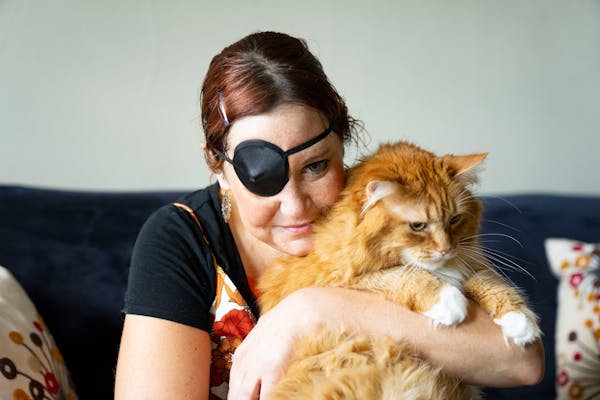Elizabeth Graca, known as Betsy, fought cancer with a rare combination of grace and pluck, finding humor even in the darkest places.
For example: turning the custom-made, head-immobilizing facemask used in her radiation sessions into a work of art. To celebrate completing her treatment, Graca vanquished the torturous device by sawing it, smashing it and setting it afire.
Then she posted a video of the destruction on Twitter, where she'd become something of a digital-era memoirist.
After Graca died on Feb. 28 at age 36, her obituary noted that she considered the outcome of her battle a draw, as a favorite comedian had once joked. Yes, cancer killed Graca; but the cancer died, too — that wasn't a loss, but a tie.
Graca, a graduate of Burnsville High School and the University of Minnesota, was a 34-year-old copywriter and social butterfly enjoying life in Minneapolis when she was diagnosed with cholangiocarcinoma, a rare bile duct cancer.
The disease had already spread to her brain, liver and bones — a stage at which life expectancy is usually measured in months. But Graca bravely underwent aggressive treatment for nearly three years.
"She wasn't given a lot of cause for hope, or a better life down the road, but I think she saw purpose in fighting until her last breath because there was meaning and purpose in that struggle," said her close friend Ian Ringgenberg.
Navigating the challenges of the medical system, Graca became a knowledgeable, strong-willed self-advocate. The diagnosis revealed her as a real warrior, said her brother Andrew Graca. "I never thought of her as a resilient badass until she got sick," he said. "Then we learned, oh, my God, my sister is really tough."
Graca started sharing updates on Facebook and her blog, BetsyVersusCancer.com, before gaining an audience of thousands on Twitter, where she aired her unfiltered thoughts under the moniker the Fighting Loaf (Ringgenberg gave her the nickname after Graca said she felt like a loaf, recovering from treatments in bed).
Followers appreciated the utter honesty with which Graca documented her emotional roller coaster: the fear of a worrisome scan, the frustration of insurance hassles, the joy of a Friendsgiving feast, plus a few morbid jokes tossed in for good measure.
Those who knew Graca online were drawn to the same wit, insight and thoughtfulness as those who knew her personally. "She had a magnetic personality," said her father, Timothy Graca. "She was a shining bright light, even in her worst times."
In being so open about her experience, Graca shed more light on the physical effects of cancer as well as its toll on mental health. She publicly parsed the complexity of her emotions as she reconciled her unfavorable odds of survival with her hope of defying them. More than most, she understood the powerful connection that comes from having one's feelings validated.
"At first I was too ashamed to post about this, but ultimately, I decided it's more important I bring my experiences to the group as real, raw and unfiltered as they feel," Graca wrote on her blog. "After all, don't we all have strong, weak, happy, scared and courageous moments? Isn't that what being human is all about?"
Graca was preceded in death by her mother, Kathleen Graca. She is survived by her father, Timothy, and brothers Michael and Andrew. Services have been held.




